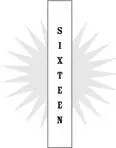As for a Japanese speaker, he does not understand the Mandarin newspaper at all. His spoken language is about as similar to Mandarin as Hungarian is to English. However, for historical reasons, Japanese is partially written with Chinese characters (along with other characters that stand for sounds). So when a Japanese speaker sees a Mandarin newspaper, he may indeed be able to recognize a number of the characters, but that doesn’t mean he will be able to form anything more than a fuzzy guess at what it all means. The situation is comparable to a Hungarian speaker seeing the English sentence “I saw the information about the crime on television.” Because Hungarian makes use of the international loanwords informacio, krimi , and televizio , a speaker will recognize “information … crime … television,” and she might guess the meaning of the sentence correctly. However, she might make the same guess if the sentence says, “I took the information about the crime and hid it behind the television ,” and in that case her guess would be quite off the mark. And anyway, her interpretation of “crime” is probably wrong to begin with, since krimi means not “crime” but “crime story” or “detective novel” in Hungarian. The best a Japanese speaker can do with a Chinese text is pull out a big jumble of words. And a lot of them will mean something slightly—or even totally—different from what they mean in the Chinese version.
No, Chinese characters do not offer a magical ride to the land of pure ideas. Just a f@!*% hard slog to the city of words.

After Bliss’s first visit to Toronto things started to look up for Blissymbolics. He now had a real, practical success story to add to his dossier. He commenced an aggressive letter-writing campaign that got him some major international press, including an article in Time magazine. People from all over the world began to contact the center in Ontario, looking for more information about its program. McNaughton and her team began to develop educational materials and a teacher training protocol, so that others could take advantage of this new communication tool.
The more successful the program became, the more Bliss complained about the way the teachers at the center were doing things. They didn’t draw the lines thick enough; the proportions were wrong; they used “fancy” terms like “nouns” and “verbs” (terms used by the evil grammar teachers, the torturers of his youth) to describe what he called “things” and “actions.” Every time McNaughton sent him materials to look over, he wrote back lengthy tirades about all the ways they had gotten his system wrong. He was outraged that in one of their textbooks, they showed his symbol for vegetable,  , next to a picture of various vegetables, including tomatoes. They had totally misunderstood his system! This was the symbol for things you eat (mouth symbol) that grow underground! Tomatoes don’t grow underground! The symbol for those kinds of vegetables is this:
, next to a picture of various vegetables, including tomatoes. They had totally misunderstood his system! This was the symbol for things you eat (mouth symbol) that grow underground! Tomatoes don’t grow underground! The symbol for those kinds of vegetables is this:  !
!
Bliss failed to see that the ultimate goal of the program was to teach the children to express themselves in English. At first, the iconicity of the symbols was important. The children couldn’t read yet, so they needed a way to recognize a word. The teachers would introduce a new symbol by pointing out how it resembled the object it stood for or, in the case of more abstract symbols, by explaining its motivation. Then the symbol would be added to each child’s symbol board—a grid of squares, each containing a symbol, with the English word written underneath it. In interactions with others, the children would pick out a word by recognizing its symbol and pointing to it; the person they were talking to would understand it by reading the English below it. Over time, with the use and interaction by which we all come to understand the meaning of words, the imagery in the symbol would become less important, just a slight reminder of the word it stood for. The English word “vegetable” does cover tomatoes. And for the children using it,  was just a nonalphabetic way to get to that word.
was just a nonalphabetic way to get to that word.
The teachers did the best they could to accommodate Bliss’s criticisms. But his objectives were completely at odds with the practical problems they had to face. When the teachers encouraged the children to remember the symbol for “food,”  by picturing it as a plate with a spoon under it, he was livid. It was crucial to his system that it be understood as the “mouth” above the “earth” because the true meaning (according to his “logical” system) was “all food which our mouth takes from Mother Earth .” When one of their newsletters showed a symbol sentence meaning “The Toronto Maple Leafs beat the Pittsburgh Penguins,” he lamented, “All in spite of my condemnation of competitive sport in my book!” When they used the combination “food + out” to mean “picnic,” he proclaimed, “FALSE!” It did not mean “picnic”; it meant “food out at a restaurant.” When they wrote to him to request symbols for words they needed, he rarely responded. But he criticized without fail when they came up with something themselves.
by picturing it as a plate with a spoon under it, he was livid. It was crucial to his system that it be understood as the “mouth” above the “earth” because the true meaning (according to his “logical” system) was “all food which our mouth takes from Mother Earth .” When one of their newsletters showed a symbol sentence meaning “The Toronto Maple Leafs beat the Pittsburgh Penguins,” he lamented, “All in spite of my condemnation of competitive sport in my book!” When they used the combination “food + out” to mean “picnic,” he proclaimed, “FALSE!” It did not mean “picnic”; it meant “food out at a restaurant.” When they wrote to him to request symbols for words they needed, he rarely responded. But he criticized without fail when they came up with something themselves.
He had created a “universal” language that nobody else could figure out how to use.
The staff’s plan to keep Bliss away from the administration didn’t last very long. He wrote to the principal, to the doctors, to the minister of health. He complained about the ways in which his symbols were being abused, and he started to demand some of the money he was convinced was pouring in from all sides.
He would come back to visit every spring, bearing gifts and kisses for everyone, and fervent apologies for those who had received some of his harsher letters. Then he would go back to Australia and start in again. Why hadn’t anyone acknowledged his gifts? Didn’t they realize how much he had spent on them? Didn’t they realize he barely earned enough to afford the canned peas, mincemeat, and small pinch of beetroot he subsisted on day by day? Did they ever think about that while they collected the fat salaries they earned off the sweat of his life’s work?
In fact, they were struggling to attract resources and support for their program. They needed to convince granting agencies and government officials of the value of this new and experimental teaching method. Shirley was on one side arguing against those who thought needs-based pictures (a toilet, a cup, a sandwich) were “good enough” and on the other side arguing against those who thought they should just start off by teaching the kids to spell. Meanwhile, Charles was traveling around Canada dismantling any progress they had made. He gave public lectures that were nothing more than point-by-point critiques of all their “mistakes.” He badgered government officials to convince the OCCC teachers to stop damaging the children by using his system incorrectly (at one point he ambushed the Ontario minister of education outside his home). In Bliss’s mind, he was helping the center to do a better job, and he expected them to be grateful.
So it was a surprise to him when, on his 1974 visit, the director of the OCCC called Bliss into his office and told him never to come back. They had had enough. In another room, on another floor, an Australian and Canadian film crew was setting up to record a scene for a documentary they were making about Bliss. Shirley went up to get him. He was shaken, coughing nervously, but he said nothing about what had just happened. He drank a glass of water and, in the time it took them to walk downstairs, transformed himself back into the jolly, hopping firecracker that he always seemed to be in front of an audience. He went ahead and performed for the camera and the children, grabbing a globe to demonstrate how far away Australia was. When I first watched the film, Mr. Symbol Man , I didn’t notice anything different about him in the scene. But after hearing the story from Shirley, I went back and watched it again. After he puts down the globe, he sits off to the side as Kari dictates a letter to her teacher through her symbol board. He seems uncharacteristically subdued, and a little confused. His face is drained of animation and painfully vulnerable. A few scenes later he is back in Australia, sitting at his desk, smiling and throwing his hands up in dramatic exasperation. “People don’t listen to me! They look right through me! What should I do? What should I do?” Then he turns away with a desperate, high-pitched laugh that’s almost too much to bear.
Читать дальше


 , next to a picture of various vegetables, including tomatoes. They had totally misunderstood his system! This was the symbol for things you eat (mouth symbol) that grow underground! Tomatoes don’t grow underground! The symbol for those kinds of vegetables is this:
, next to a picture of various vegetables, including tomatoes. They had totally misunderstood his system! This was the symbol for things you eat (mouth symbol) that grow underground! Tomatoes don’t grow underground! The symbol for those kinds of vegetables is this:  !
! was just a nonalphabetic way to get to that word.
was just a nonalphabetic way to get to that word. by picturing it as a plate with a spoon under it, he was livid. It was crucial to his system that it be understood as the “mouth” above the “earth” because the true meaning (according to his “logical” system) was “all food which our mouth takes from Mother Earth .” When one of their newsletters showed a symbol sentence meaning “The Toronto Maple Leafs beat the Pittsburgh Penguins,” he lamented, “All in spite of my condemnation of competitive sport in my book!” When they used the combination “food + out” to mean “picnic,” he proclaimed, “FALSE!” It did not mean “picnic”; it meant “food out at a restaurant.” When they wrote to him to request symbols for words they needed, he rarely responded. But he criticized without fail when they came up with something themselves.
by picturing it as a plate with a spoon under it, he was livid. It was crucial to his system that it be understood as the “mouth” above the “earth” because the true meaning (according to his “logical” system) was “all food which our mouth takes from Mother Earth .” When one of their newsletters showed a symbol sentence meaning “The Toronto Maple Leafs beat the Pittsburgh Penguins,” he lamented, “All in spite of my condemnation of competitive sport in my book!” When they used the combination “food + out” to mean “picnic,” he proclaimed, “FALSE!” It did not mean “picnic”; it meant “food out at a restaurant.” When they wrote to him to request symbols for words they needed, he rarely responded. But he criticized without fail when they came up with something themselves.










